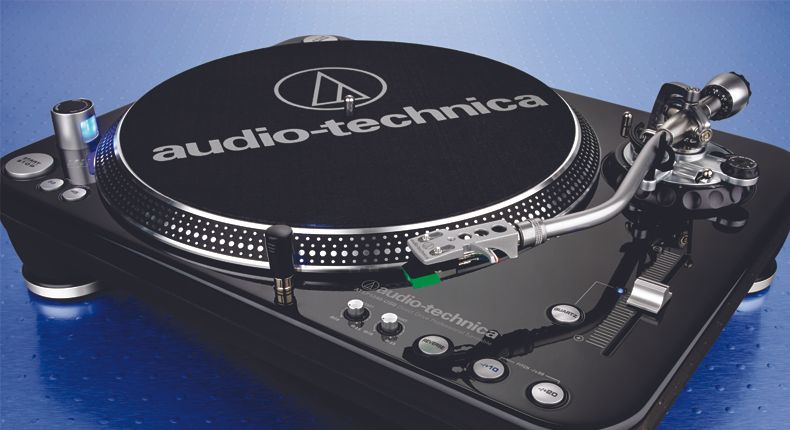Reloop has been producing professional audio equipment since 1996, and a dedicated hi-fi section was established two years ago. The £650 Turn5 is the company’s top-of-the-line turntable, and it’s essentially an SL-1200 clone with the exception of the variable speed control and a distinct paint job…
It’s not quite as good as the Technics, but it’s still worth a look because, despite its low price, it’s closer to the Japanese classic than you might believe. Indeed, if you’ve only ever used similarly priced Regas or Pro-Jects, you’ll be blown away by how much record player you get for your money.
The plinth of the 458x162x368mm deck is finished in satin dark charcoal and weighs a hefty 12.8kg. The gold-anodized 332mm platter weights 1.8kg and has significant rubber dampening below. The platter is spun at 33, 45, and 78 RPM using a brushless, 16-pole, 3-phase, directly powered DC motor. The fact that it has a strobe on its outer ring, complete with a bright white LED, attests to its torque. If you apply a record brush to a spinning platter, for example, you’ll need to press down quite hard to observe it slow down. Of course, the original Technics is preferable in this regard, but it’s still significantly superior to the typical belt drive. Even today’s best high-end belt drives can’t match the advertised 0.01 percent wow and flutter figure.
The statically balanced S-shape tonearm isn’t quite as good as the Japanese original, which wasn’t exactly outstanding, but it’s still a cut above most Technics knockoffs. With its satin black finished aluminium armtube and gold accents on some minor components, it does feel like a neat, precise product. It tracks cartridges weighing between 3.5 and 8.5g with the supplied headshell and comes with a very decent Ortofon 2M Red moving magnet cartridge, which would cost £95 if purchased separately. Although my review sample had the VTA set a touch low, it is pre-fitted and aligned in the headshell. Adjusting this was simple; in fact, all of the arm’s adjustments were simple.
Despite the fact that the base isn’t as robust as any SL-1200, the AC mains plug isn’t buried away like it is on the Technics original. The gold-plated RCA phono outputs, as well as the accompanying connection cable, are high-quality components. The feet aren’t wonderful, but they don’t feel cheap, and the lid isn’t bad either – though I’d recommend using it with the lid open for greater sound. This deck might benefit from a variety of upgrades, ranging from a better isolation feel to a better platter mat, armlead, and headshell. That’s the beauty of vinyl: it’s really adaptable. It’s easier to set up than any comparable belt drive because there’s no need to mess with a belt.
The sound is fast, crisp, and detailed, exactly what you’d expect from a good direct drive. It boasts a tight, controlled, and gripping sound that plays recordings in a straightforward manner. It appears authoritative and mature at all times, which is no small feat for the price. Wrapped Around Your Finger by The Police transports you to an expansive soundscape, with Steward Copeland’s drumming taking center stage. The Reloop Turn5 has a gripping, sinewy feel to it, and it keeps a firm grip on the drum, bass guitar, and rhythm tracks. When you play it loud, you can really appreciate his dynamite snare and rim shot fills, and the bass drum seems like it’s being banged in the chest. Because of its overall control, it’s hard to realize you’re listening to a turntable of this price.
It’s also good at stereo imaging, albeit the results are a little more qualified here. The midband of the Reloop is incredibly clear and controlled, but it lacks the width of the best belt drives I’ve heard at this price point. Instead, the turntable’s metronomic precision draws attention away from a somewhat reduced stereo spread. It returns rather well, demonstrating that this is more than a two-dimensional performer. Pat Metheny’s airy jazz rock This is Not America reinforced this, allowing me to discern all the many strands of the mix with pinpoint accuracy, while David Bowie’s vocals hovered over everything in a ghostly fashion.
The tone of the turntable is very balanced, with a somewhat heavier bass than many of its price competitors and a highly defined midband paired with a vibrant treble. There’s no indication that this deck is shrill or scratchy, as some cheap direct drives can be. Instead, it bombards you with information and allows you to experience the various strands of the mix as they interact. Many of its rubber-band-powered pricing rivals, on the other hand, are reduced to an amorphous blob of music. The deck’s sturdy plinth and super-stable drive mechanism explain at least some of the deck’s thick low bass, which gave piano cadences a lot of weight. The ride cymbal work up top, on the other hand, is finely carved and smooth without being harsh.
Reloop’s Turn5 is bouncy, tighter, and more dynamic than its belt-drive competitors, with a little more emphasis as well. This, not the fact that it’s a Technics knockoff for wannabe DJs, is the secret to its popularity. It turns out to be far superior to most clones of this type, and is certainly worth considering if you can’t buy the latest Technics SL-1200GR or don’t want to take the belt-drive route.






